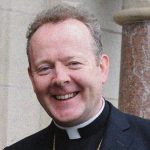Archbishop Eamon Martin reflects on Pope John Paul II’s historic visit to Ireland
I am often asked about when I first decided to become a priest. It’s a difficult question to answer, but I have no doubt that the visit of Pope John Paul II to Ireland in 1979 was highly significant for my vocation. I was just turning 18, and in my final year at school.
I had applied to Queen’s University in Belfast to do engineering but the idea of serving God in the priesthood was ‘niggling’ at me. And then the Pope arrived!
My sister had just passed her driving test and she offered to take me and my brother to Drogheda to see the Pope. I now realise the significance of his visit there. The Pope had wished to travel to the North, but the Troubles were spiralling out of control – only the previous month at Warrenpoint, 18 British soldiers and a civilian died in an IRA bomb and gun attack.
On the same day, Lord Mountbatten and three other people were murdered by an IRA bomb on board a boat on the coast of Co. Sligo. So, instead of coming north to Armagh, the see of St Patrick, the Pope chose to visit Drogheda, south of the border but still in the Archdiocese of Armagh, and not far from the site of the Battle of the Boyne.
Drogheda is also near the Hill of Slane where St Patrick lit the first Paschal Fire in Ireland. In Drogheda, Pope John Paul II proclaimed Jesus, the light of the world, as the Hope of the future of Ireland. He spoke of peace, reminding us of the martyr St Oliver Plunkett whose dying words were words of forgiveness for all his enemies.
The Pope then said something which made a lasting impression on me and on many Irish people.
Grown up
I had grown up in a city which resounded almost daily with the noise of bombs and bullets; armed troops patrolled the streets and searched our schoolbags; our priests led us in vigils and processions for peace. But this was different. With his voice trembling in prayer and emotion, the Holy Father was unequivocal with the men and women of violence. He said: “Violence is evil… violence is unacceptable as a solution to problems… it goes against the truth of our faith, the truth of our humanity”.
In language of passionate pleading, he added: “On my knees I beg you to turn away from the paths of violence and to return to the ways of peace.”
In my youthful naivety I remember thinking: the Pope has spoken; now the violence will end! But more than that, the Holy Father had nourished the seed of God’s call in me. I wondered: What can I do to make a difference, to bring the love, joy and hope of Christ to others?
Young people
The next week in school our religion teacher played a tape of Pope John Paul’s words to the young people of Ireland in Galway. There, the Pope spoke about the temptation as you get older to leave religion and your faith behind, to think that religion cramps your style and hampers your future, that with all the amazing social and scientific progress the world has to offer, you don’t need God; you can organise your own life.
But then he called out to the hundreds of thousands of young people present: “Something else is needed! Something that you will find only in Christ… In Christ you will discover the greatness of your own humanity!”
That phrase “something else is needed” has stayed with me all my life. I am convinced that it was pivotal in my decision to give my life to God as a priest. This weekend as Pope John Paul is canonised, I will thank God for his visit to Ireland and the part it played in bringing me to where I am today.


 Archbishop Eamon Martin
Archbishop Eamon Martin